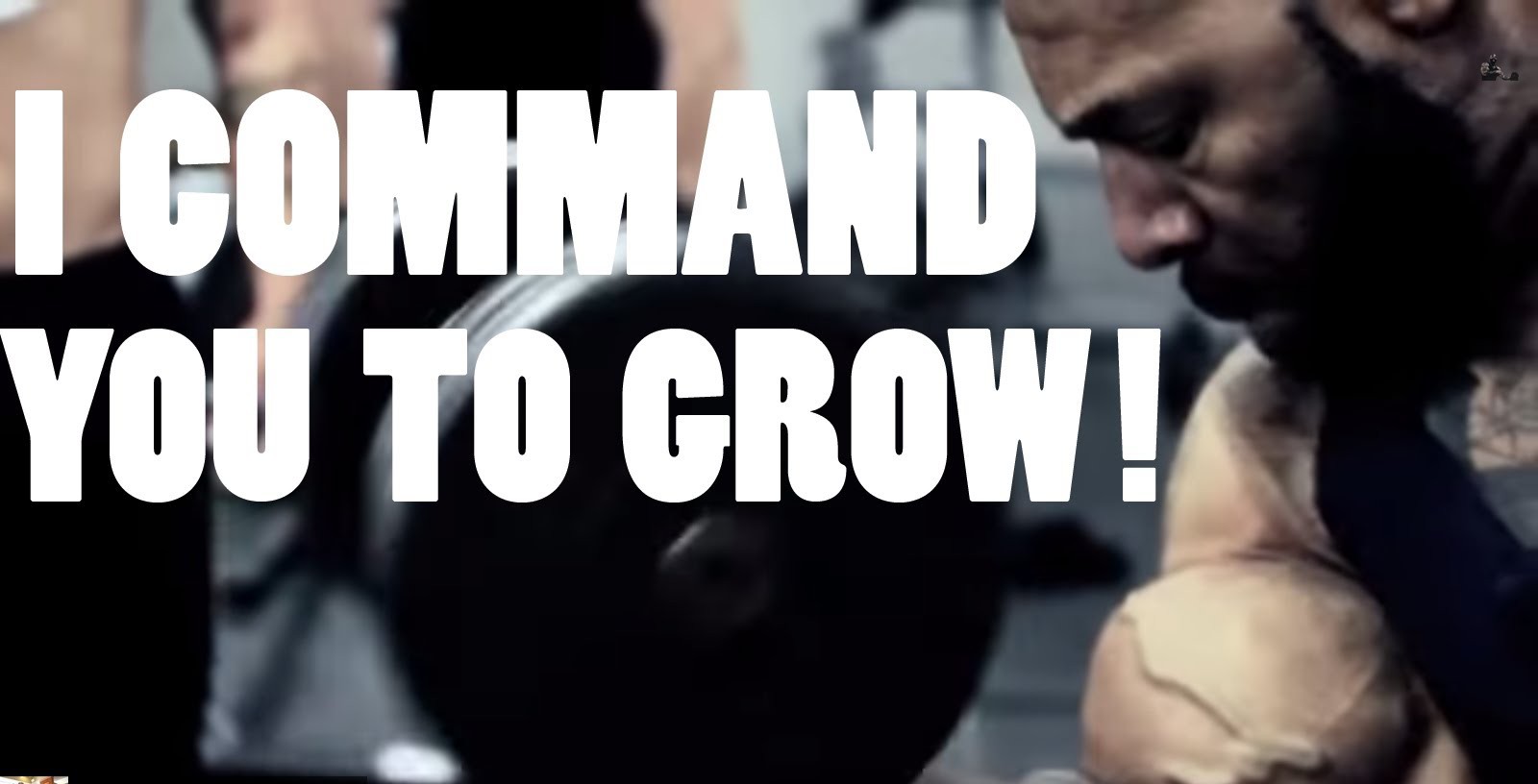Some people have a hard time getting to the gym, but for others going to the gym is a necessary part of life, an addiction, even. Exercise becomes a controlling mechanism, it is a way for us to seize control of our bodies and health. It is proactive. It is a concrete action with immediate and long-term benefits. Conversely, rest and recovery feels passive: sit, breath, lay down, relax, do nothing. Doing nothing feels counter to your goals of acquiring the physique of your dreams, that 500 pound back squat, that first pull-up, or that six minute mile. Yet, rest and recovery can mean the difference between gains and stagnation, fat-loss or fat retention (especially in unwanted areas).
Even food becomes counter to your goals. You start to feel like eating will only make you fat, or that feeling full is somehow bad, or that certain foods are "bad," or "evil." You notice that, while you're full, you look "fat," so you begin to associate eating well with fat gain. Some of us fall into a cycle of deprivation, starvation, breakdown and binging, which leads to hopelessness and guilt, then a repetition of the process; deprivation, starvation, binge, repeat. Eating disorders, and disorders in general, exist on a spectrum, and people of all shapes, sizes and athletic backgrounds struggle with food, especially as humans in this modern age, where there is food, but there are also edible food-like substances.
Workout less, eat more food is counter intuitive. It sounds like a recipe for fat gain, but if you are working out six or seven days a week, even five days a week, this may actually be a recipe for muscle gain, hormonal recovery and reduced fat in unwanted areas, like the abdomen and supra iliac, as hormone levels influence fat storage on the body. If you are working out relentlessly, without seeing the physical changes you desire, assuming that the programming is sound, the answer may not be more work, but less work, more food and more rest.
I have seen a tendency for ambitious athletes to favor "recovery workouts" or "active recovery" over more passive means of recovery, but I think, in most cases, this is a mistake, because it becomes an excuse to workout every day and spend more energy when we should be reserving our energy for muscle growth and adaptation. Chances are, if you are doing recovery workouts, you are using them as a means to achieve fat loss rather than recovery, thinking that expending more energy is going to get you that jaw-dropping six-pack, or even just a reduction in belly fat. Again, nutrition is the answer here, not more running and random activity. And, once again, recovery, specifically passive forms of recovery, like massage and meditation, can be more effective in achieving fat-loss, muscle growth, health and overall wellbeing.
Though it feels passive, recovery is proactive, as you must create the conditions for optimal recovery. Though there are many forms of active recovery, the optimal form of recovery is meditation. Massage is also crucial, especially if you are an athlete who trains three to five days a week.
When you train, you are applying stress to your body. Because this is wanted stress, we look at training as a eustressor, a positive, desirable stress. However, stress is stress, whether perceived as positive or not. Chronic application will have negative effects, though symptoms will be hard to pinpoint, and will be different for everyone.
You may not feel anything. You may just stagnate; hit a ceiling. Maybe, once in a while, or even on a regular basis, you'll feel a certain malaise. Maybe you've been living with it for so long, you forgot what it feels like to feel energetic and hungry. So hungry that you don't fear workouts for malaise, you crush them out of hunger, because you need to make it count, because you're not run-down. You've got gusto, fire, and testosterone (ladies, too). You don't just go through the motions, you attack the workouts with vigor and enthusiasm.
Ambitious athletes like to feel beat-down. They like the feeling of a grueling workout and the aftermath--the euphoria. I like it, too. That runner's high. That feeling of putting in a solid day of work. I understand why you do it. I did it, too. But I'm telling you now that you need to chill!
[youtube https://www.youtube.com/watch?v=JUGisre9xNU&w=640&h=480]
Of course, I guess I have to underscore that consistency is always key. I'm not saying, don't workout for a week, then go hard, or that two days a week is enough to see results. I'm saying that if you are the kind of person who works out 5+ days a week, for more than an hour a day, consider what I have outlined above. Consider some silent meditation, instead of a recovery run. Increase intake of whole foods, especially organic, local vegetables and fruits. Give yourself room to not do a conditioning piece five days a week. Give yourself room to grow.
Recently, I have taken the luxury of removing conditioning from some days, so that athletes are only doing 3 conditioning workouts a week. Still, we are lifting heavy, completing one of the most feared squat programs on the planet: Smolov Jr. A squat program that demands that you eat and recover. I know some of you feel like you need to do a conditioning piece five days a week, but I've got news for you: doing that extra row, or run, or whatever, unless it is strictly skill work, is not doing you any good, neither for muscle gain, nor for fat loss. Again, nutrition, and rest, especially if you are working out 5 days a week, is the answer, not more work.
Professional athletes workout long hours, but they also spend time on recovery as soon as they are done training, and they have off-seasons. Remember that: off-season. They have an entire season, when in some cases, they do not practice their sport at all. Furthermore, there is a tendency in sport to use substances that enhance recovery potential. That's how some athletes can put in 6 hours of work a day and recover. Without a doubt, top athletes in unregulated or under-regulated sports (like Crossfit, or Grid Sport) are using performance enhancing drugs. You don't have a structured off-season, and you're not on growth hormones, so pace yourself. Technically, this is our "off-season," if we take the Crossfit Open to be our five-week season, hence the drop in the amount of wall ball shots, and conditioning in general. Still, our total work output remains the same, and we have not reduced the load or volume, but have increased it slightly, especially when we consider the demanding nature and intensity of Smolov Jr., and the back squat. Just like the deadlift, the back squat is very demanding on the central nervous system, and because of the high loading potential, requires more time to recover from than, say, a heavy snatch or a heavy clean. You may feel like you are tip-top, but in the midst of Smolov Jr., you most likely are not.
Sometimes, doing nothing is doing everything. The potential for growth is increased when we eat well, sleep, and rest. Growth happens outside of the gym, not in it. The only thing in the gym is poison, and all you need is a little bit, a non-lethal dose. Too much or too little, and you will not grow, or your growth will be mediocre, at best.
Maybe I have described you in this article. Maybe you are feeling a little hurt, maybe even like I am talking to you personally, but I'm not; the issues outlined above are common. But, I have to say, that if I have described you, you are a woman/man after my own heart. I love ambition in the gym. I love people who love the grind. People who don't complain about work. People who don't make excuses. People who dive in, all in. People who do work and love it. People who are willing to go the extra mile. But, as your coach, I know that running your body into the ground and under-eating is not a recipe for success in the long-term. Workout less, eat more food. If you are inconsistent at the gym, or are a sedentary individual, this article isn't for you; get into the the gym, go on a run, play and be active. For some of you, though, this may be the best advice to achieve your goals of fat loss, muscle gain, increased power and increased strength.


